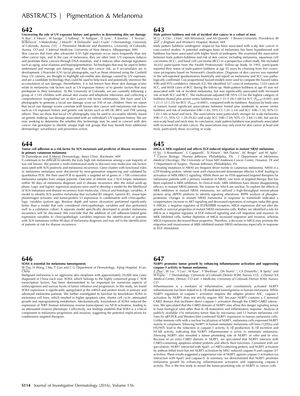SOX4 Is Essential for Melanoma Tumorigenesis
April 2016
in “
Journal of Investigative Dermatology
”

TLDR SOX4 is crucial for the development of melanoma.
The document reports on various studies related to skin cancer, melanoma, and factors affecting their development and progression. One study from the University of Colorado followed 1,145 children, using UV photography to generate facial sun damage scores, which correlated with known skin cancer and melanoma risk factors such as UV exposure history and genetic risk factors like MC1R, IRF4, and TYR. Another study from the Mayo Clinic identified molecular risk factors for sentinel lymph node (SLN) metastasis and melanoma recurrence in over 700 melanoma samples, finding that the addition of cell adhesion-linked gene expression to clinicopathologic variables improved identification of patients with SLN metastases and may aid in identifying those at risk for disease recurrence.
A study from Xijing Hospital in China found that SOX4 expression is significantly upregulated in melanoma patients and that knockdown of SOX4 in melanoma cell lines resulted in reduced tumor progression and invasion, suggesting potential for targeted therapies. Brown University's study with 36,032 participants found that male pattern baldness was associated with an increased risk of squamous cell carcinoma (SCC) and basal cell carcinoma (BCC), especially for cancers occurring on the scalp. Thomas Jefferson University's research on mutant NRAS melanoma indicated that MEK inhibition led to increased migration and invasion, particularly in response to EGF stimulation, due to decreased expression of MIG6, a negative regulator of EGFR/ERBB receptors. Lastly, the University of Colorado Denver SOM's study on human melanoma showed that NLRP1 promotes tumor growth by enhancing inflammasome activation and suppressing caspase-3 activity, revealing a tumor-promoting role of NLRP1 in cancer cells.




